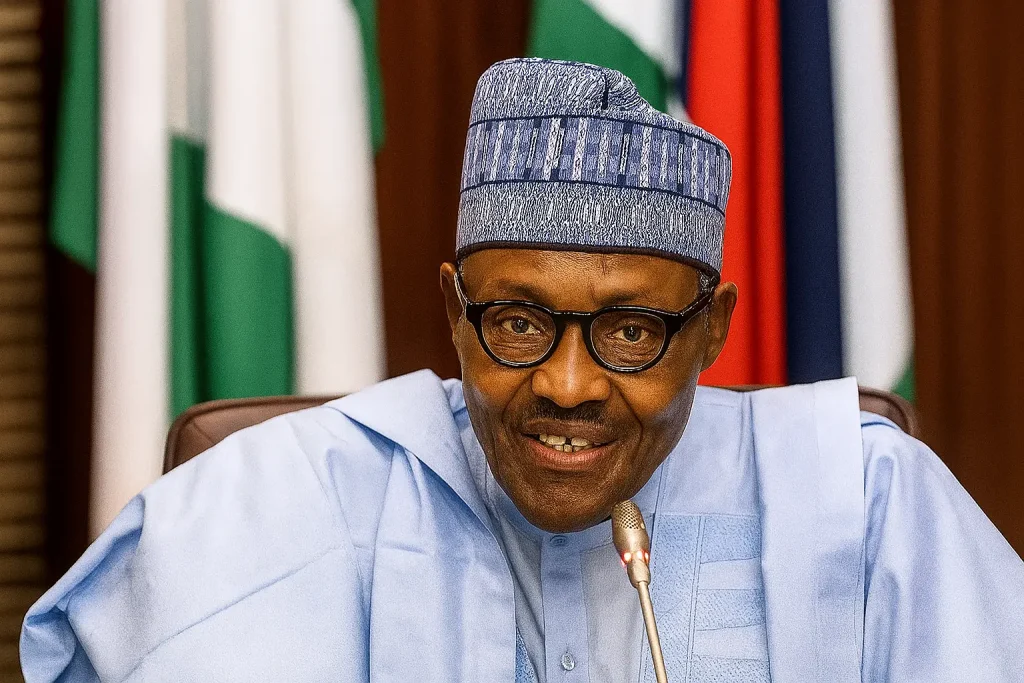Born on December 17, 1942 in Daura, Katsina State, he had a promising career in the military where he rose to become a general and served in various capacities. He played a critical role during the Nigerian Civil war and subsequently occupied different positions in the military, especially during the various military regimes that led the country after the civil war in 1970 until the return to civilian regime in 1979.
Post-civil war positions.
He was a member of the Supreme Military Council during the Murtala/Obasanjo military regime from July 1975 to October 1979. He also served as the Military Governor of North Eastern State and also as the Federal Commissioner of Petroleum Resources. It was during his term as the person in charge of the Petroleum Ministry that the issue of N2.8 billion missing oil fund came up.
After the handover of the rein of government to civilians, Buhari was made the General Officer Commanding, GOC, Third Mechanised Division with the headquarters in Jos, Plateau State. It was during his period as the GOC, that some Chadian rebels strayed into the country and took over some territories belonging to Nigeria. Without even waiting for the directive of the then Commander in Chief of the Armed Forces of Nigeria, President Shehu Shagari, Buhari mobilised troops and chased the invading forces deep down into the Republic of Chad. Shagari was to chastise him for his excesses.
Coup of December 31, 1983.
With the contentious general elections of 1983 during which the ruling National Party of Nigeria, NPN, claimed it won from the Sahara Desert to the Atlantic Ocean, people’s dissent against the administration grew. It was no surprise that the military struck again and surprisingly, Buhari was named the Head of State with Brigadier Tunde Idiagbon as his Chief of Staff, Supreme Headquarters.
His first speech was for him to describe the new government as an Offshoot of the Murtala/Obasanjo Regime.
Draconian Degrees
While the Buhari/Idiagbon regime was settling down, it enacted some decrees seen by many as very draconian. Some of the decrees were Decree Two of 1984. The decree allowed for the detention of people without trial.
Also, Decree Four of 1984 was to protect public officers against false accusations. That decree was seen by many as gagging the press. The issue of the N2.8 billion the allegedly missing oil money came into fore.
Two journalists, Nduka Irabor and Tunde Thompson were jailed on the basis of that decree.
Another decree many Nigerians condemned the government for enacting was the one that prohibited trafficking in hard drugs. It was decried because it was made to have retroactive effects and on the basis of that, some persons including Lawal Ojuolape and Bathlomew Owoh were publicly executed.
However, most Nigerians commended the regime for enacting the decree on War Against Indiscipline, WAI, that ensured orderliness in public places and cleaning of the environment among others.
His overthrow by Ibrahim Babangida
While many people in the military knew that it was his deputy, General Idiagbon that was the power behind the regime, he was overthrown on August 27, 1985 when Idiagbon went on pilgrimage to Saudi Arabia. Most members of the SMC switched allegiance to Ibrahim Babangida, who now headed the Armed Forces Ruling Council, AFRC.
The development literally turned Buhari to a recluse after being released from house arrest.
Engagement in politics
With the advent of civilian rule in 1999, Buhari was initially quiet politically until 2003 when he joined the then All Peoples Party, APP, which later changed to the All Nigeria Peoples Party ANPP. He contested the 2003 presidential election without much financial backing from political heavy weights. He garnered over 10 million votes.
He later formed the Congress for Progressive Change, CPC , and also contested the 2007 presidential poll and secured more than 12 million votes. His feat was recognized as great because he even didn’t campaign in most parts of the South. In 2011, he repeated the same feat and even vowed not to contest again after he lost.
However, as the opposition gathered to get the ruling Peoples Democratic Party, PDP, out of the way in 2015, the need to bring Buhari in was inevitable as his cult following in the North was obviously needed. Truly, he became the candidate of the All Progressives Congress, APC, and the party won the presidential poll. He won reelection in 2019.
Tenure as civilian leader
For most part of his tenure as civilian president, he suffered recurring bouts of illnesses and spent so much time abroad attending to his health. Some critics blamed the lack lustre performance of the administration on his poor health. Some also blamed him for the escalation in insecurity in the country, especially the menace of rampaging killer herders.
Life after office.
Before he took ill and was taken abroad for treatment before he eventually died, Buhari kept a low profile. He retired to his Daura home and sometime showed up in Kaduna too.




